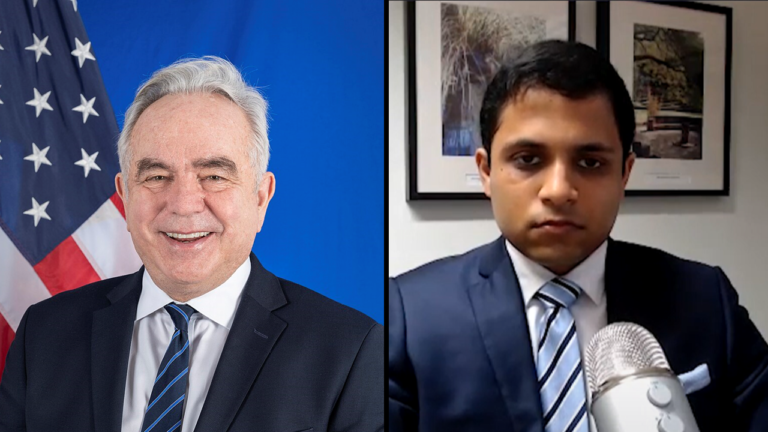Kurt Campbell Unveils US Indo-Pacific Strategy in Exclusive Interview with Adil Cader
11th March 2024
In an exclusive interview with Adil Cader, Dr. Kurt Campbell, shared first-hand the Biden administration’s approach to engagement in the Indo-Pacific region. The interview took place in June 2023 when Dr. Campbell was serving as the White House Coordinator for the Indo-Pacific. The interview was hosted in collaboration between Talking Foreign Affairs and the UWA Defence and Security Institute. Dr. Campbell’s insights shed light on critical aspects of US foreign policy and provided perspectives on the strategic vision driving American involvement in the region while balancing critical foreign policy issues in other regions of the world.
Dr. Kurt Campbell currently serves as the US Deputy Secretary of State, having been appointed by President Biden in February 2024. Prior to this, he served as the White House Coordinator for the Indo-Pacific and was instrumental in the establishment of regional frameworks such as The QUAD and AUKUS. He helped organise the landmark Quad Summit, followed by successful meetings at the White House with the leaders of Japan and Korea. He played a pivotal role in shaping the Obama administration’s Asia-Pacific policies when he served as the Assistant Secretary of State for East Asian and Pacific Affairs. He is widely credited as being a key architect of the “pivot to Asia” during his term.
He has also led The Asia Group and the Centre for a New American Security, as well as serving as the director of the Aspen Strategy Group. Considered one of the leading voices for US engagement in Asia, he is the author and editor of ten books on foreign policy, most notably, The Pivot: The Future of American Statecraft in Asia.
Pivot to Asia
Addressing the notion of the “Pivot to Asia,” Dr. Campbell candidly acknowledged the challenges faced in maintaining sustained commitment to the region. Criticised in the past for lacking follow-through and being sidelined by emergencies elsewhere, he highlighted the Biden administration’s renewed effort to refocus attention and allocate resources to the Indo-Pacific.
Dr. Campbell recognised that domestic priorities have previously hindered the pivot’s progress. When questioned on how the administration will keep focus on the pivot given the current war in Eastern Europe, he mentioned that the approach involves integrating resources and capabilities to ensure a more comprehensive and sustained engagement in the region. The administration aims to overcome past setbacks and establish a robust and consistent presence in the Indo-Pacific.
This went into his broader point on the importance of the Indo-Pacific as a global epicentre. Dr. Campbell underscored its critical role in shaping world politics, innovation, and technology. He pointed out that the region hosts also all major global political challenges, including issues with rogue and failed states. Notably, outside the US, the Indo-Pacific has gained attention from regions as far as Europe and the Middle East, further highlighting its strategic importance on the global stage. For example, over the last 3 years, both Canada and the European Union have launched Indo-Pacific strategies.
Dr. Campbell highlighted the Indo-Pacific Economic Framework (IPEF) as a cornerstone of the US strategy in the region. Serving as a modern regional arrangement, the IPEF aims to foster cooperation and economic integration. The US, being the largest investor in almost every country in the Indo-Pacific, seeks to strengthen economic ties through initiatives like the IPEF.
The IPEF’s focus extends to addressing critical areas such as infrastructure, supply chains, and access to crucial minerals. Dr. Campbell stressed the importance of economic partnerships, aligning with the broader goal of advancing shared economic interests in the Indo-Pacific.
“The lion’s share of the 21st Century is going to happen in the Indo-Pacific and the US has to play a central role”
– Kurt Campbell
China and Taiwan
Navigating the complexities of U.S.-China relations, Dr. Campbell advocated for a nuanced approach. While acknowledging the competitive aspects of the relationship, he expressed the administration’s desire for collaboration on global challenges. Issues like climate change, health crises, and non-proliferation were highlighted as areas where common ground can be found, showcasing a commitment to constructive engagement despite differences.
On the issue of Taiwan, Dr. Campbell affirmed the US commitment to maintaining peace and stability in the Indo-Pacific. Stressing the importance of preserving the current peaceful status quo, he emphasised the need for dialogue and diplomatic solutions to prevent any unilateral changes. This stance reflects the administration’s dedication to regional stability and a commitment to peaceful resolutions.
In conclusion, Dr. Kurt Campbell’s interview provided a comprehensive exploration of the Biden administration’s Indo-Pacific strategy. The renewed commitment, recognition of the region’s global significance, and focus on economic engagement through platforms like the IPEF underscore the US’s intention to play a pivotal role in shaping the Indo-Pacific’s future.
Dr. Campbell’s insights shed light on the intricate balance between competition and cooperation, showcasing a diplomatic approach prioritising stability, economic growth, and collaborative solutions to shared challenges. As the U.S. continues to navigate the complex geopolitical landscape, Dr. Campbell’s perspective offers insight on the path forward in this vital region, ensuring a thoughtful and strategic presence in the Indo-Pacific.



Your blog is a true hidden gem on the internet. Your thoughtful analysis and engaging writing style set you apart from the crowd. Keep up the excellent work!